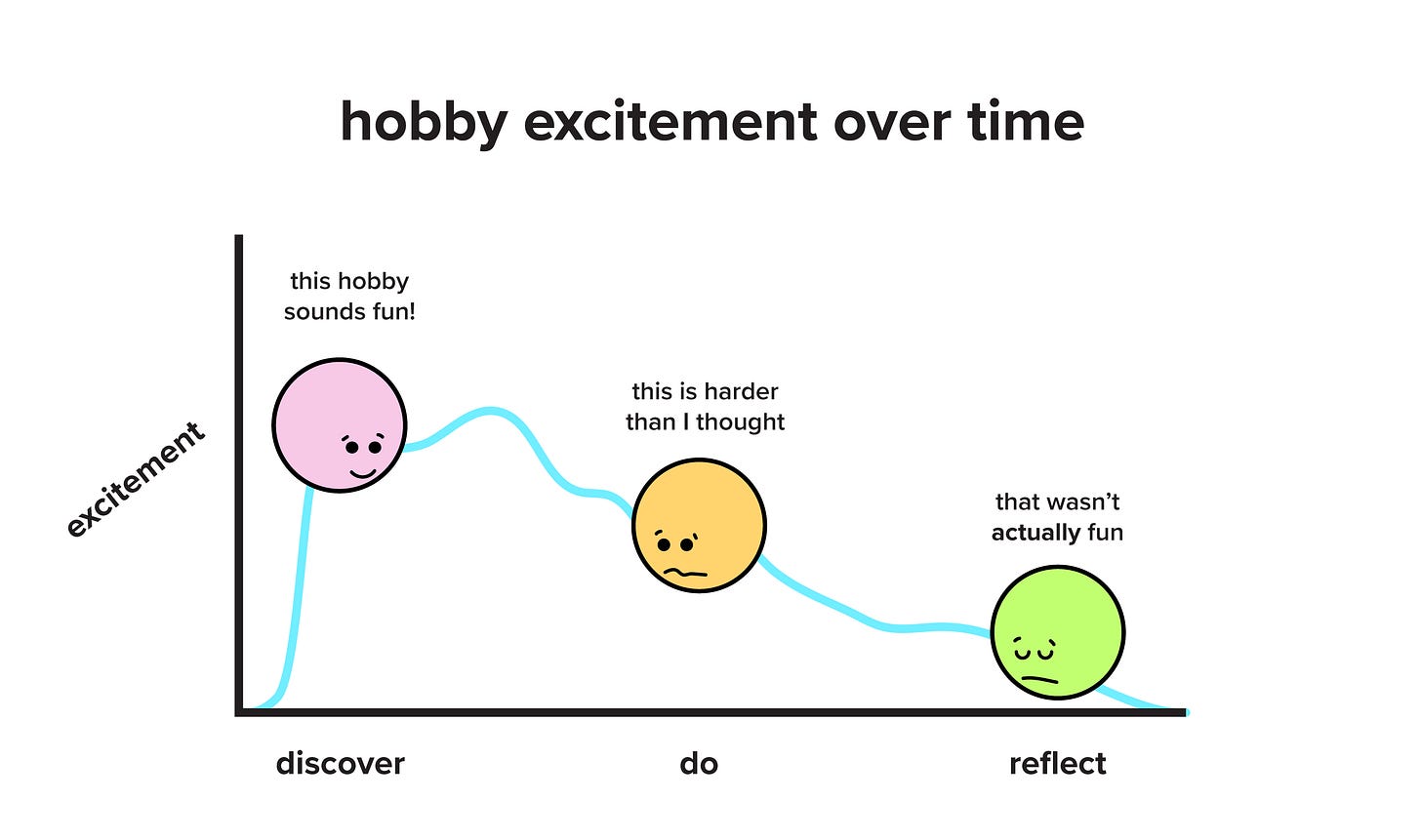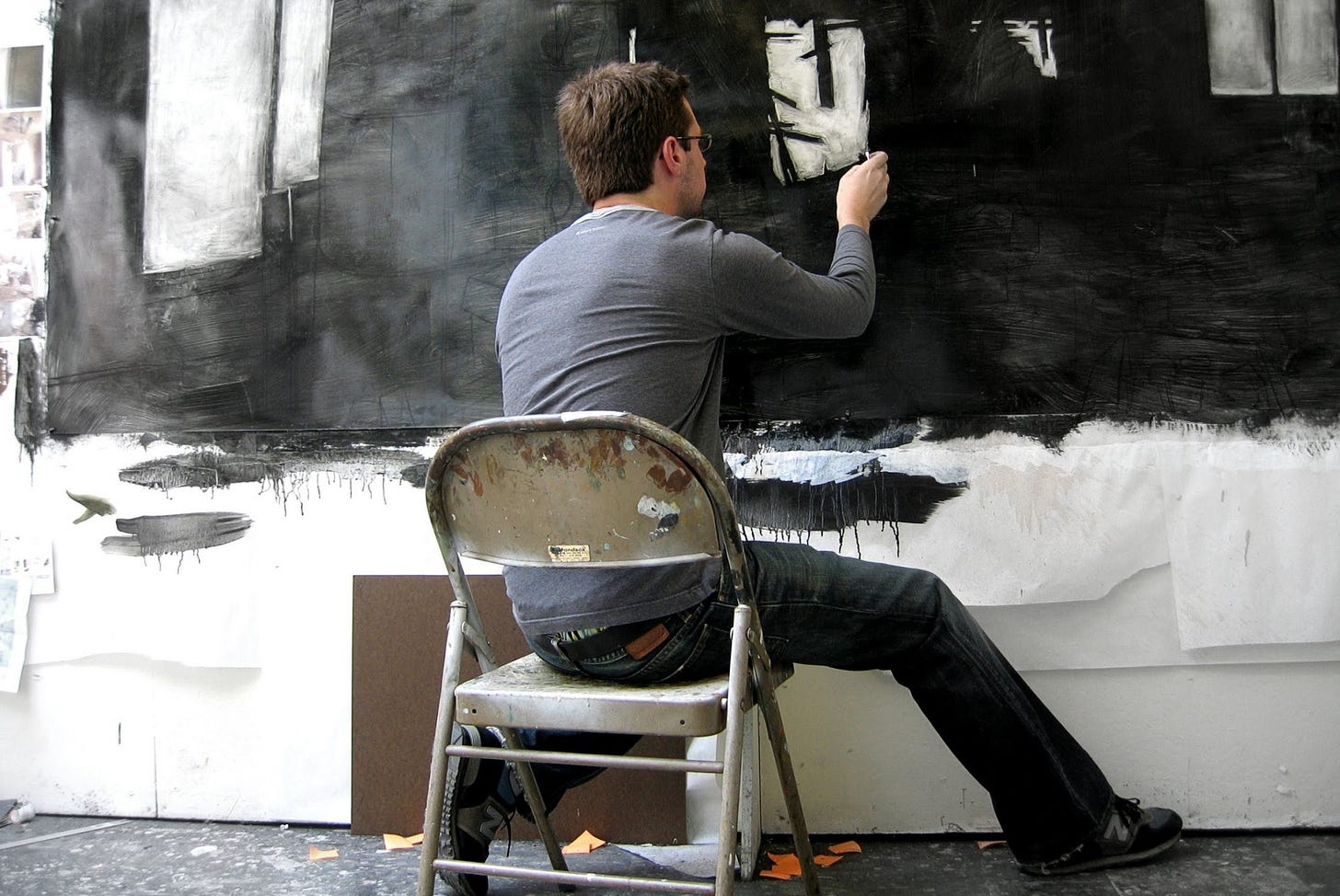The importance of foundations
In my research on creative hobbies I’ve seen many reasons why a new hobby may not “stick” for folks. But a common cycle is: someone gets excited to try a new creative hobby, dives in deep, has a not-so-great time, and then decides the hobby isn’t for them.
It reminds me of a lesson I learned as an art major in college.
Starting with the basics
My co-founder and I both showed up to college ready to make some Art with a capital “A.” We soon learned that we—and all our fellow art majors—had to spend two years in foundational art classes before we were allowed to “make what we wanted.”
During intro courses, we were given specific assignments. Still life setups we had to paint, colors we had to mix (in gouache, no less!), and nude models we had to draw. We also spent a lot of time studying art history, memorizing countless artists and artworks, and writing essays about them.
“When will we be able to make the Art we actually want to make?”
- every underclass art major at Skidmore College
We eagerly awaited our junior year when we would finally have the creative freedom to make whatever we wanted, and to use our Art to tell the stories and express the ideas that we wanted to convey.
Ready to go (kind of?)
Two years later we started Advanced-level studio classes. Each of us was assigned a little ~5' x 8' nook in a cement-floored classroom. We were instructed to put clean white paper up on the movable walls, and were told to go. We needed to prepare art of our choosing for a critique the following week.

We finally had the freedom we’d all been waiting for, but that blank wall and open brief were incredibly intimidating. I remember struggling to figure out what to make, what I wanted to convey, and how best to convey it.
It took time for each of our little nooks to fill up with ideas, sketches, and finished work. But as we put in the hours in the studio, fed off each other’s energy, and started creating Art, it was clear that we were applying our foundational skills and understanding of materials, methods, and the artists who had come before us. It also became clear that if we had been given an open brief on the first day of our freshman year, we would have lacked the foundation and skills needed to create the work we were making. Our excitement would’ve quickly taken a nose dive, and we may have all decided “art is not for me.”
This experience forever changed my outlook on life and built my appreciation for taking the time to learn, grow, and recognize the immense value in understanding the basics.
Creative hobbies have foundations, too
Creative hobbies definitely do not require two years of art school as a prerequisite, but there is typically a learning curve. And while not quite the same as an empty studio you need to fill and a looming critique, starting a new creative hobby can feel daunting or inaccessible without the proper foundation and the support of a community. There’s often no curriculum, no clear entry point, and no way to gauge your skill level to ensure you're tackling the right level of challenge to stay motivated. Unlike my experience as an art student, there aren’t professors explaining that you need to walk before you can run, and that yes, it is valuable to grasp the fundamentals before diving into something more advanced.
I wholeheartedly support people trying a hobby that’s completely new to them and possibly outside their skill-level. It can be fun and rewarding! But it can also lead to frustration or a deer-in-the-headlights moment, which is not the best way to build a lifelong creative habit that brings joy and functions as self-care.
So, if you are interested in making dollhouses, but haven’t done much mini-making before, it may make sense to start with a kit or a simple furniture project before trying to refurbish a vintage dollhouse you find on Facebook marketplace. Or if you want to make Gundam robot models (which have a wide array of difficulty levels), you may get discouraged if you start with the smallest, most intricate kit.
When we launch our startup, my co-founder and I intend to help people find and maintain the right balance in their creative hobbies, and provide the support needed to build foundations—and expand upon them.





My mind starts wandering, thinking about how different skills need different foundations, and how you might need to use different approaches to build different foundations--at different ages. It becomes fractal.